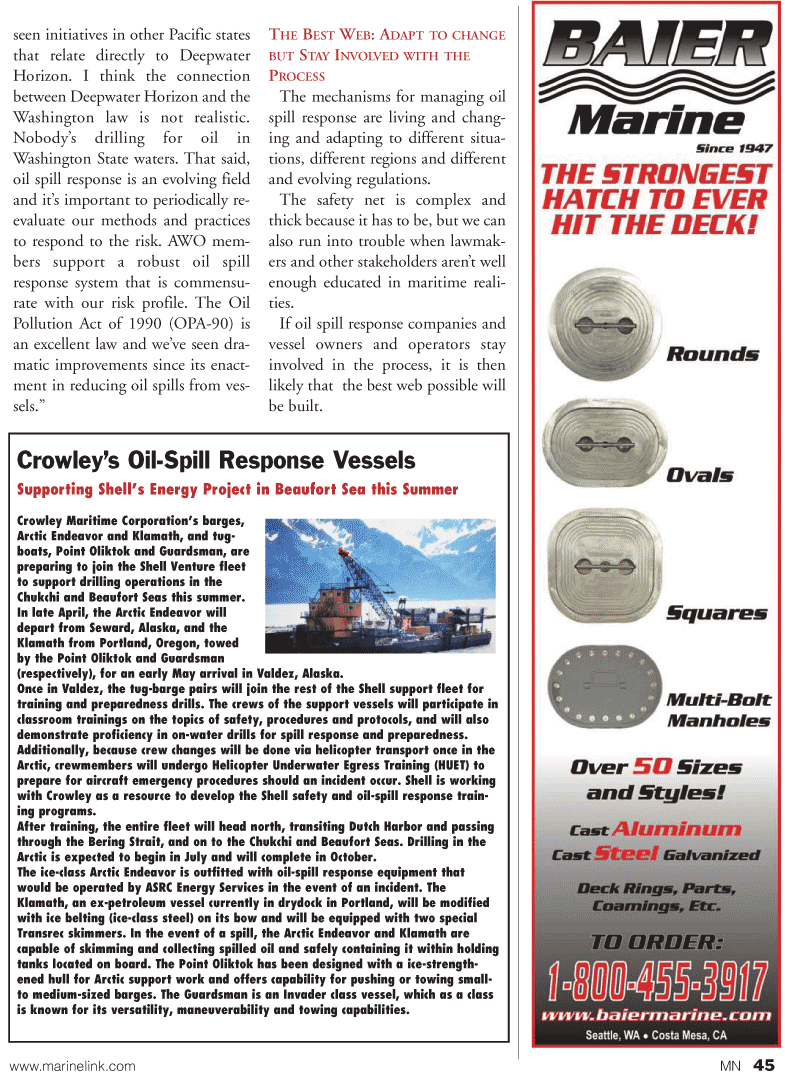
Page 45: of Marine News Magazine (April 2012)
Offshore Service Operators
Read this page in Pdf, Flash or Html5 edition of April 2012 Marine News Magazine
seen initiatives in other Pacific states that relate directly to Deepwater Horizon. I think the connection between Deepwater Horizon and the Washington law is not realistic. Nobodys drilling for oil in Washington State waters. That said, oil spill response is an evolving field and its important to periodically re- evaluate our methods and practices to respond to the risk. AWO mem- bers support a robust oil spill response system that is commensu- rate with our risk profile. The Oil Pollution Act of 1990 (OPA-90) is an excellent law and weve seen dra- matic improvements since its enact- ment in reducing oil spills from ves- sels.?THEBESTWEB: ADAPTTOCHANGE BUT STAY INVOLVEDWITHTHE PROCESS The mechanisms for managing oilspill response are living and chang- ing and adapting to different situa- tions, different regions and different and evolving regulations. The safety net is complex andthick because it has to be, but we can also run into trouble when lawmak- ers and other stakeholders arent well enough educated in maritime reali- ties. If oil spill response companies and vessel owners and operators stay involved in the process, it is then likely that the best web possible will be built. www.marinelink.com MN45Crowleys Oil-Spill Response Vessels Supporting Shells Energy Project in Beaufort Sea this SummerCrowley Maritime Corporations barges,Arctic Endeavor and Klamath, and tug-boats, Point Oliktok and Guardsman, arepreparing to join the Shell Venture fleetto support drilling operations in theChukchi and Beaufort Seas this summer.In late April, the Arctic Endeavor willdepart from Seward, Alaska, and theKlamath from Portland, Oregon, towedby the Point Oliktok and Guardsman(respectively), for an early May arrival in Valdez, Alaska. Once in Valdez, the tug-barge pairs will join the rest of the Shell support fleet fortraining and preparedness drills. The crews of the support vessels will participate inclassroom trainings on the topics of safety, procedures and protocols, and will alsodemonstrate proficiency in on-water drills for spill response and preparedness.Additionally, because crew changes will be done via helicopter transport once in theArctic, crewmembers will undergo Helicopter Underwater Egress Training (HUET) toprepare for aircraft emergency procedures should an incident occur. Shell is workingwith Crowley as a resource to develop the Shell safety and oil-spill response train-ing programs. After training, the entire fleet will head north, transiting Dutch Harbor and passingthrough the Bering Strait, and on to the Chukchi and Beaufort Seas. Drilling in theArctic is expected to begin in July and will complete in October.The ice-class Arctic Endeavor is outfitted with oil-spill response equipment thatwould be operated by ASRC Energy Services in the event of an incident. TheKlamath, an ex-petroleum vessel currently in drydock in Portland, will be modifiedwith ice belting (ice-class steel) on its bow and will be equipped with two specialTransrec skimmers. In the event of a spill, the Arctic Endeavor and Klamath arecapable of skimming and collecting spilled oil and safely containing it within holdingtanks located on board. The Point Oliktok has been designed with a ice-strength-ened hull for Arctic support work and offers capability for pushing or towing small-to medium-sized barges. The Guardsman is an Invader class vessel, which as a classis known for its versatility, maneuverability and towing capabilities.

 44
44

 46
46
